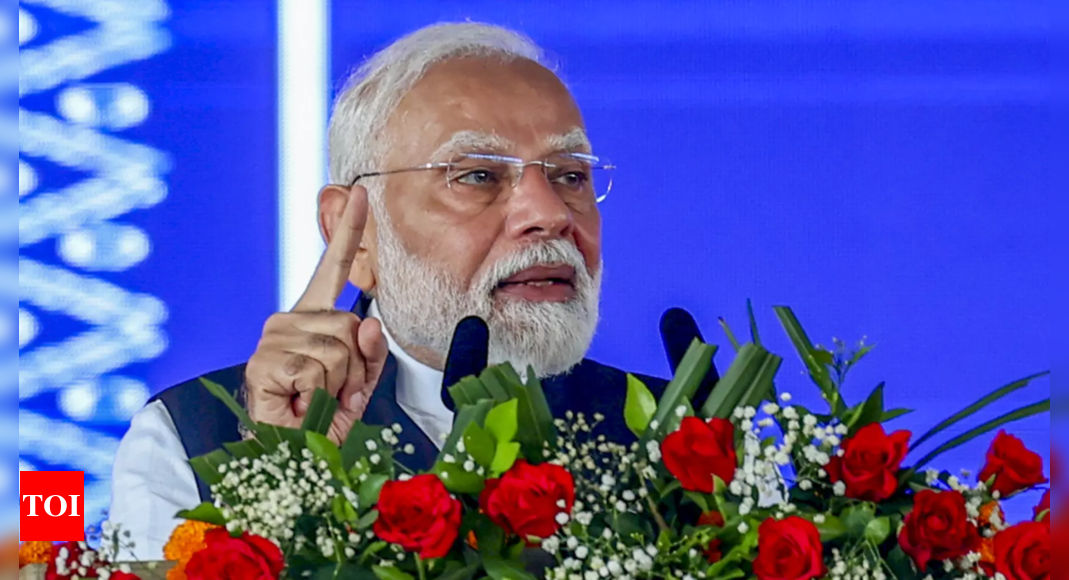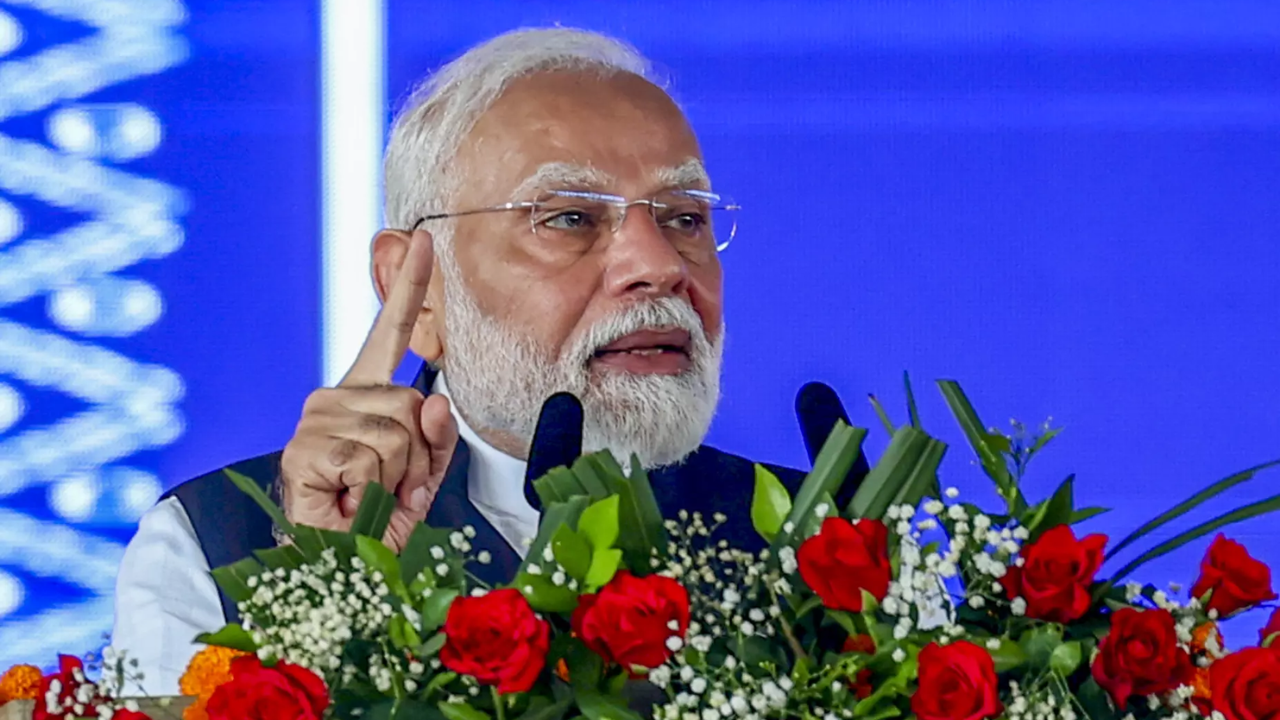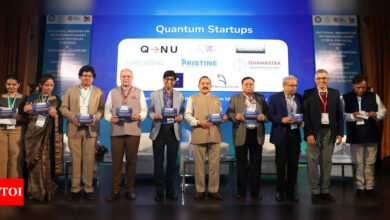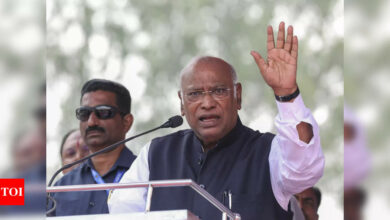India
PM Modi calls for local solutions to global problems, says there is no dearth of resources for scientific community – Times of India



NEW DELHI: Prime Minister Narendra Modi on Tuesday said the scientific community will not face any dearth of resources for their efforts and stressed the need to identify and remove hurdles in the research ecosystem and focus on local solutions to global problems that are relevant to India’s needs.
He made these remarks while chairing the first board meeting of the newly formed Anusandhan National Research Foundation (ANRF). During the meeting, it was decided to launch a programme in the ‘hub and spoke’ mode by linking universities, where research is still in its nascent stages, with leading established institutions to enhance the research capabilities of higher education institutions.
Currently, less than 1% of the country’s 40,000 higher education institutions (HEIs) are engaged in research activities. The “hub and spoke” framework through the Partnerships for Accelerated Innovation and Research (PAIR) programme is expected to enable these institutions to systematically improve their research quality.
The foundation will also launch programmes for ‘solution-oriented research’ in mission mode in selected priority areas such as electric vehicle (EV) mobility, advanced materials, solar cells, smart infrastructure, health and medical technology, sustainable agriculture and photonics.
Modi, speaking at the meeting, talked about developing a dashboard where information on research and development in the country could be easily tracked, and proposed classifying labs, creating a list of domain experts based on their expertise and promoting research in various areas, including battery ingredients for electric vehicles and lab-grown diamonds. He also discussed the need for “upgrading and standardisation” of institutions.
The governing body discussed various areas of strategic interventions, including positioning India globally in key sectors, aligning R&D with national priorities, promoting inclusive growth, capacity building, fostering scientific advancement and an innovation ecosystem, as well as bridging the gap between academic research and industrial applications through industry-focused translational research.
It was also decided to establish Centres of Excellence to support interdisciplinary research in the humanities and social sciences. Participants, including Education Minister Dharmendra Pradhan (vice chairman of the governing body) and the government’s chief scientific adviser Ajay Sood, agreed that there was a need for flexible and transparent funding mechanisms to facilitate research.
“We expect these centres of excellence to drive excellent research output and boost the global rankings of Indian institutions,” Abhay said Karandikasecretary of the science and technology department, during a briefing about the meeting.
Established under the ANRF Act 2023, the Foundation acts as an apex body to provide high-level strategic direction to scientific research in the country as per the recommendations of the National Education Policy. It forges partnerships between industry, academia and government departments and research institutions.
The ANRF has earmarked a total budget of Rs 50,000 crore for five years (2023-2028), of which a major portion of about 70% is estimated to come from non-governmental sources.
“ANRF plans to seed, grow and foster a culture of research and innovation across the country, with a focus on diverse disciplines including natural sciences, engineering, technology, environmental and earth sciences and health,” said Karandikar.
The governing body directed that the foundation’s strategies should be aligned with the objectives of ‘Viksit Bharat’ (Developed India) 2047 and that the implementation of its programmes should conform to the best practices followed by research and development agencies globally.
He made these remarks while chairing the first board meeting of the newly formed Anusandhan National Research Foundation (ANRF). During the meeting, it was decided to launch a programme in the ‘hub and spoke’ mode by linking universities, where research is still in its nascent stages, with leading established institutions to enhance the research capabilities of higher education institutions.
Currently, less than 1% of the country’s 40,000 higher education institutions (HEIs) are engaged in research activities. The “hub and spoke” framework through the Partnerships for Accelerated Innovation and Research (PAIR) programme is expected to enable these institutions to systematically improve their research quality.
The foundation will also launch programmes for ‘solution-oriented research’ in mission mode in selected priority areas such as electric vehicle (EV) mobility, advanced materials, solar cells, smart infrastructure, health and medical technology, sustainable agriculture and photonics.
Modi, speaking at the meeting, talked about developing a dashboard where information on research and development in the country could be easily tracked, and proposed classifying labs, creating a list of domain experts based on their expertise and promoting research in various areas, including battery ingredients for electric vehicles and lab-grown diamonds. He also discussed the need for “upgrading and standardisation” of institutions.
The governing body discussed various areas of strategic interventions, including positioning India globally in key sectors, aligning R&D with national priorities, promoting inclusive growth, capacity building, fostering scientific advancement and an innovation ecosystem, as well as bridging the gap between academic research and industrial applications through industry-focused translational research.
It was also decided to establish Centres of Excellence to support interdisciplinary research in the humanities and social sciences. Participants, including Education Minister Dharmendra Pradhan (vice chairman of the governing body) and the government’s chief scientific adviser Ajay Sood, agreed that there was a need for flexible and transparent funding mechanisms to facilitate research.
“We expect these centres of excellence to drive excellent research output and boost the global rankings of Indian institutions,” Abhay said Karandikasecretary of the science and technology department, during a briefing about the meeting.
Established under the ANRF Act 2023, the Foundation acts as an apex body to provide high-level strategic direction to scientific research in the country as per the recommendations of the National Education Policy. It forges partnerships between industry, academia and government departments and research institutions.
The ANRF has earmarked a total budget of Rs 50,000 crore for five years (2023-2028), of which a major portion of about 70% is estimated to come from non-governmental sources.
“ANRF plans to seed, grow and foster a culture of research and innovation across the country, with a focus on diverse disciplines including natural sciences, engineering, technology, environmental and earth sciences and health,” said Karandikar.
The governing body directed that the foundation’s strategies should be aligned with the objectives of ‘Viksit Bharat’ (Developed India) 2047 and that the implementation of its programmes should conform to the best practices followed by research and development agencies globally.




